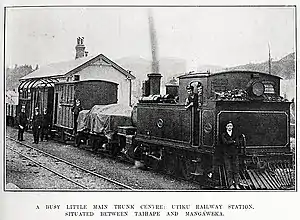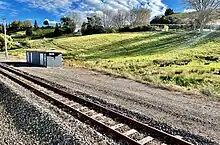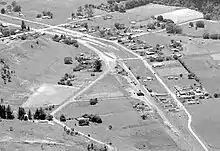Utiku railway station | |||||||||||
|---|---|---|---|---|---|---|---|---|---|---|---|
 Utiku railway station in 1908 | |||||||||||
| General information | |||||||||||
| Location | New Zealand | ||||||||||
| Coordinates | 39°44′10″S 175°50′35″E / 39.736125°S 175.842999°E | ||||||||||
| Elevation | 371 m (1,217 ft) | ||||||||||
| Line(s) | North Island Main Trunk | ||||||||||
| Distance | Wellington 243.69 km (151.42 mi) | ||||||||||
| History | |||||||||||
| Opened | 27 May 1904 | ||||||||||
| Closed | Passengers 31 January 1982 Goods 31 October 1986 | ||||||||||
| Electrified | June 1988 | ||||||||||
| Services | |||||||||||
| |||||||||||

Utiku railway station was a station on the North Island Main Trunk in New Zealand, and in the Manawatū-Whanganui region. It opened in 1904 and closed in 1986.[1][2][3] It was part of the 13+1⁄2 mi (21.7 km) Mangaweka to Taihape section, officially opened by the Prime Minister, Richard Seddon, on 21 November 1904.[4] It closed in 1986.[5][6] A passing loop remains.[7]
The name Utiku had a biblical origin as a transliteration of Eutychus.[8]
History

The station was planned in 1902,[9] when work on the line had reached Utiku.[10] Tenders were put out in August 1903, track had been laid as far as Toi Toi Viaduct by February 1904[11] and the 7 mi 75 ch (12.8 km) extension from Mangaweka to Utiku opened for goods traffic on Friday, 27 May 1904.[9] though worked by the Public Works Department. Goods were worked through to Taihape from 4 August 1904.[9] On Saturday, 10 September 1904 Utiku opened for passengers[12] as a flag station, with a shelter shed and platform. Three days later a contract was let to Russell & Bignell of Whanganui for £1203.5s to build the station, which was ready by 21 February 1905. In 1906 a 40 ft (12 m) by 30 ft (9.1 m) goods shed was added.[9] It had a cart approach, loading bank, cattle and sheep yards, fixed signals and a passing loop for 50 wagons, which was extended to 100 wagons in 1970 and 126 by 1980. Due to growing business,[13] the station was enlarged[14] and a stationmaster appointed in 1907. A telephone was added in 1909.[9]

Utiku was important enough to have annual returns of its traffic recorded, as was Taihape to the north and Hunterville to the south. For example, it had 6,599 passengers in 1923, but was 4th largest on NIMT in terms of sheep and pig inwards traffic and still had a substantial timber trade, both inwards and outwards.[15]
On 31 January 1982 the station closed to all but Ravensdown fertiliser in wagon lots and to that on 31 October 1986.[9]
In 2017 a bank to the south of the station[16] was strengthened with shotcrete and soil nails.[17]

Toi Toi Viaduct
Toi Toi Viaduct lies about south of Utiku.[18] It is 59 m (194 ft) long and up to 58 m (190 ft)[19] above the Toi Toi Creek.[20] The contract for the steelwork went to Scott Bros of Christchurch.[21] Work on the viaduct was under the cooperative system. It was completed in February 1904[22] and tested in September 1904.[23] It is one of the few dating from that era, though it was strengthened in 1934.[23] The Mangaweka deviation of 1981 starts just south of the viaduct.[24]
Timber
When the railway opened the area was still extensively forested.[25] Like other stations along this part of NIMT, this station had freight from several timber mills.
On 11 May 1904,[9] before the line opened, Albert Gibbs[26] applied for a siding at Utiku.[9] A cable[20] of the tramway suspension bridge, which led to their mill,[22] broke in 1912,[20] resulting in the mill being shut[24] until a new bridge, mill and tramway opened in 1914,[27] the plans having been drawn in 1913.[28] Similar collapses occurred in 1904[29] and 1920, though no one was killed then.[30] The 1914 bridge was replaced in 1961. Only the northern tower of the 1914 bridge remains.[31] In 1922 the Gibbs Bros butter box factory[32] was blown down.[33] It finally burnt down in 1927.[34]
Knight's had a siding 52 ch (1.0 km) north of the station from 1904, when they planned a 7 mi (11 km) tramway.[35] Perham & Larsen also had a mill north of the station,[36] until they moved to Rangataua in 1909,[37] and they and Manawatu Timber Co both had sidings in 1906. As the bush was depleted, mills closed. In 1909 there were 9 mills, but in 1911 only two.[38]
Incidents
In 1910 a landslip in a cutting[21] near Utiku derailed a goods train.[22] A freight train derailed in 2006 on the crossing loop, due to stiff couplings.[18]
References
- ↑ Juliet Scoble: Names & Opening & Closing Dates of Railway Stations in New Zealand
- ↑ Yonge, John (1985). New Zealand Railway and Tramway Atlas (Third ed.). Quail Map Company. p. 9. ISBN 090060932X.
- ↑ Pierre, Bill (1981). North Island Main Trunk. Wellington: A.H&A.W Reed. pp. 289–290. ISBN 0589013165.
- ↑ "GALA DAY AT TAIHAPE. MANAWATU TIMES". paperspast.natlib.govt.nz. 21 November 1904. Retrieved 7 January 2021.
- ↑ Juliet Scoble: Names & Opening & Closing Dates of Railway Stations in New Zealand
- ↑ Pierre, Bill (1981). North Island Main Trunk. Wellington: A.H&A.W Reed. pp. 289–290. ISBN 0589013165.
- ↑ "Huia St". Google Maps. June 2015. Retrieved 10 January 2021.
- ↑ "NEW ZEALAND RAILWAYS MAGAZINE - Utiku". nzetc.victoria.ac.nz. 1 January 1936. Retrieved 20 January 2021.
- 1 2 3 4 5 6 7 8 "Stations" (PDF). NZR Rolling Stock Lists. Retrieved 10 August 2020.
- ↑ "THE MAIN TRUNK LINE. MANAWATU STANDARD". paperspast.natlib.govt.nz. 6 January 1902. Retrieved 11 January 2021.
- ↑ "MAIN TRUNK LINE. NEW ZEALAND MAIL". paperspast.natlib.govt.nz. 3 February 1904. Retrieved 10 January 2021.
- ↑ "UTIKU NOTES. WANGANUI CHRONICLE". paperspast.natlib.govt.nz. 5 September 1904. Retrieved 11 January 2021.
- ↑ "DISTRICT NOTES. RANGITIKEI ADVOCATE AND MANAWATU ARGUS". paperspast.natlib.govt.nz. 23 March 1907. Retrieved 11 January 2021.
- ↑ "UTIKU. RANGITIKEI ADVOCATE AND MANAWATU ARGUS". paperspast.natlib.govt.nz. 13 May 1907. Retrieved 11 January 2021.
- ↑ "RETURN No. 12. Statement of Revenue for each Station for the Year ended 31st March, 1923". paperspast.natlib.govt.nz. Retrieved 11 January 2021.
- ↑ "Basemaps". basemaps.linz.govt.nz. Retrieved 11 January 2021.
- ↑ "STRONGEST SHOTCRETE WALL EVER". Abseil Access. 12 May 2017. Retrieved 11 January 2021.
- 1 2 "Toi Toi Viaduct, Manawatu-Wanganui". NZ Topo Map. Retrieved 10 January 2021.
- ↑ Yonge, John (1985). New Zealand Railway and Tramway Atlas (Third ed.). Quail Map Company. p. 9. ISBN 090060932X.
- 1 2 3 Representatives, New Zealand Parliament House of (1901). Parliamentary Debates.
- 1 2 "LOCAL AND GENERAL. NEW ZEALAND TIMES". paperspast.natlib.govt.nz. 15 April 1901. Retrieved 10 January 2021.
- 1 2 3 "OUR MANGAWEKA MAN. MANAWATU TIMES". paperspast.natlib.govt.nz. 18 February 1904. Retrieved 10 January 2021.
- 1 2 "THE MANGAWEKA VIADUCT. WAIRARAPA DAILY TIMES". paperspast.natlib.govt.nz. 12 September 1904. Retrieved 10 January 2021.
- 1 2 "1:63360 map - Sheet: N139 Mangaweka". www.mapspast.org.nz. 1979. Retrieved 10 January 2021.
- ↑ "NORTH ISLAND MAIN TRUNK RAILWAY: UNLOADING A BALLAST TRAIN AT UTIKU". www.aucklandcity.govt.nz. 26 May 1904. Retrieved 11 January 2021.
- ↑ "OBITUARY. MANAWATU STANDARD". paperspast.natlib.govt.nz. 30 July 1938. Retrieved 11 January 2021.
- ↑ "UTIKU SUSPENSION BRIDGE. RANGITIKEI ADVOCATE AND MANAWATU ARGUS". paperspast.natlib.govt.nz. 21 November 1914. Retrieved 10 January 2021.
- ↑ "Gibbs Suspension Bridge Over The Hautapu River Utiku". archivescentral.org.nz. Retrieved 11 January 2021.
- ↑ "ACCIDENTS AND FATALITIES. WANGANUI CHRONICLE". paperspast.natlib.govt.nz. 1 December 1904. Retrieved 11 January 2021.
- ↑ "TAIHAPE NOTES. RANGITIKEI ADVOCATE AND MANAWATU ARGUS". paperspast.natlib.govt.nz. 26 October 1920. Retrieved 11 January 2021.
- ↑ "IPENZ Engineering Heritage Report - Springvale Suspension Bridge" (PDF). 2014.
- ↑ "HURRICANE AT UTIKU. MANAWATU TIMES". paperspast.natlib.govt.nz. 3 July 1922. Retrieved 9 January 2021.
- ↑ "THE BOX FACTORY AT UTIKU, WHICH WAS SERIOUSLY DAMAGED AS A RESULT OF A SEVERE STORM IN THE DISTRICT". www.aucklandcity.govt.nz. 20 July 1922. Retrieved 8 January 2021.
- ↑ "DISASTROUS FIRE NEAR TAIHAPE. MANAWATU TIMES". paperspast.natlib.govt.nz. 5 April 1927. Retrieved 11 January 2021.
- ↑ "NORTH ISLAND TRUNK RAILWAY. WANGANUI HERALD". paperspast.natlib.govt.nz. 20 June 1904. Retrieved 11 January 2021.
- ↑ "UTIKU NOTES. WANGANUI CHRONICLE". paperspast.natlib.govt.nz. 15 April 1904. Retrieved 11 January 2021.
- ↑ "UTIKU NOTES. WANGANUI CHRONICLE". paperspast.natlib.govt.nz. 15 November 1909. Retrieved 11 January 2021.
- ↑ "OUR DYING FORESTS. WANGANUI HERALD". paperspast.natlib.govt.nz. 9 October 1911. Retrieved 11 January 2021.